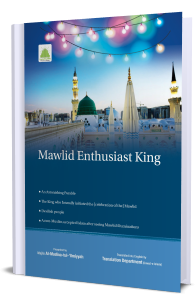
Mawlid Celebrations 800 Years Ago
Mawlana Uways Yaamin Attari Madani
On 12 Rabi al-Awwal, Muslims commemorate the birth of Allah’s final Prophet صَلَّى الـلّٰـهُ عَلَيْهِ وَاٰلِهٖ وَسَلَّم wholeheartedly. Some mark this occasion in Makka, celebrating the Prophet’s صَلَّى الـلّٰـهُ عَلَيْهِ وَاٰلِهٖ وَسَلَّم birth near his birthplace. Other visit his resting place or celebrate under the cool shade of the Green Dome. Many celebrate by reading of his blessed birth, biography, miracles, and virtues. Others express their happiness by reciting poetry in his praise, decorating their homes, adorning the streets and giving charity. In essence, the birth of the Prophet صَلَّى الـلّٰـهُ عَلَيْهِ وَاٰلِهٖ وَسَلَّم can be commemorated in any way that is not prohibited by Shar’iah. Mentioned below is the unique manner in which a king celebrated the birth of the Prophet صَلَّى الـلّٰـهُ عَلَيْهِ وَاٰلِهٖ وَسَلَّم in 7th century AH.
Al-Muẓaffar Abū Saʿīd b. Zayn al-Dīn (d. 630 AH) was the sultan of Erbil. A pious, God-fearing, generous, just, brave, and intelligent man, he was also a scholar of Islam. He was deeply devoted to the Messenger صَلَّى الـلّٰـهُ عَلَيْهِ وَاٰلِهٖ وَسَلَّم and worked extensively for Islam. Exhausting his every resource to this end, he diligently served the scholars and Sufi masters of his time.
Near Mount Qasioun, Damascus, he constructed the Hanabila Muzaffari Mosque. He also holds the distinction of being the first to organise expansive gatherings in commemoration of the Prophet’s birth. Imam Jalāl al-Dīn al-Suyūṭī رَحْمَةُ الـلّٰـهِ عَلَيْه writes, “Celebrating the Prophet’s birth in expansive gatherings was a practice initiated by the king of Erbil, al-Muẓaffar Abū Saʿīd. His name is included in the upper echelons of kings and rulers.”[1]
Ibn Kathir رَحْمَةُ الـلّٰـهِ عَلَيْه adds:
Sultan Al-Muẓaffar Abū Saʿīd would organise grand convocations to commemorate the Prophet’s birth. Shaykh Abū al-Khatṭāb ʿUmar b. Diḥya رَحْمَةُ الـلّٰـهِ عَلَيْه penned a book discussing the birth of the Prophet صَلَّى الـلّٰـهُ عَلَيْهِ وَاٰلِهٖ وَسَلَّم entitled al-Tanwīr fī Mawlid al-Bashīr wa al-Nadhīr. Abū Saʿīd proceeded to bequeath the Shaykh 1000 dinars for writing this work. He would spend 300,000 dinars on mawlid gatherings every year and 100,000 dinars on guest houses ˹for the attendees˺.[2]
The generosity, charitable endeavours, and good works undertaken by this godly king were vividly described by the historian Ibn Khallikān رَحْمَةُ الـلّٰـهِ عَلَيْه . After this description, he went on to discuss the gatherings of mawlid held under the king’s supervision:
The gatherings he conducts to celebrate the birth of the Messenger صَلَّى الـلّٰـهُ عَلَيْهِ وَاٰلِهٖ وَسَلَّم are beyond description. Every year, a vast number of people from neighbouring cities like Baghdad, Mosul, Sinjar, and Jazira would attend. They included scholars, Sufis, preachers, Quran reciters, and poets. They would arrive from as early as Muharram till the beginning of Rabi al-Awwal. Twenty or more wooden domes would be built, with each consisting of four or five tiers. When the 12th night arrived, fortresses and castles were lit up with an immense number of lamps. When morning arrived, Sufis, scholars, preachers, reciters, and poets would be gifted clothes. The king would also arrange for a rich variety of food to be distributed among the poor and needy.[3]
The grandson of Ibn al-Jawzī, Imam Shams al-Dīn Yūsuf رَحْمَةُ الـلّٰـهِ عَلَيْه , references an individual who was present in one of these gatherings, who himself disclosed the dining mat of the king being covered with food (for attendees). 5,000 goats and 10,000 chickens were cooked. 100,000 bowls of milk were also available, as well as 30,000 trays of sweet dishes.[4]
If the previously mentioned expenses of Sultan al-Muzaffar upon the mawlid were converted into modern currency, it would amount to millions. In earlier times, a singular dinar was equivalent to around 3 grams of gold. This means 300,000 dinars weighed around 900 kilos of gold; that is equivalent to over 44 million pounds (GBP) at the time of writing.
The manner in which Sultan al-Muẓaffar commemorated the mawlid is reported and praised by leading scholars including:
1. Al-Dhahabī in Tārikh al-Islam
2. Muhammad b. Yūsuf al-Ṣāliḥī in Subul al-Hudā wa al-Rashād
3. ʿAbd al-Ḥayy b. Aḥmad al-Maʿrūf al-Ḥanbalī in Shadharāt al-Dhahab
4. Al-Qastalānī in Sharḥ al-Zurqānī ʿalā al-Mawāhib
5. Abū Dhar Aḥmad b. Ibrahīm in Kunūz al-Dhahab fī Tārikh Ḥalab
6. Jamāl al-Dīn Muhammad b. Sālim al-Ḥamawī in Mufarrij al-Kurūb fī Akhbār Banī Ayyūb
The 11th century scholar and commentator of hadith, Mulla ʿAlī al-Qārī رَحْمَةُ الـلّٰـهِ عَلَيْه mentions the sheer number of attendees from varying parts of the world and the generosity of Sultan al-Muzaffar. He remarks:
When I was humbled by the scale and quality of the hosting that we experienced, I decided to compile this work. In this manner, others who did not attend may glean an inkling of what was to be found in these gatherings, and they thus become permanently recorded upon the pages of history. Mention of these gatherings will not be confined to a specific time, as a result.[5]
As you can see, the ulema endorsed and celebrated the mawlid, basking in its glory and thanking Allah for sending the Prophet صَلَّى الـلّٰـهُ عَلَيْهِ وَاٰلِهٖ وَسَلَّم to us. From the above-mentioned accounts, we can learn how to spend in the way of Allah and how to hold mawlid gatherings. There are countless blessings and endless benefit to be reaped from this.


















Comments